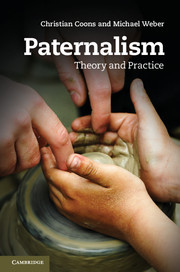Book contents
- Frontmatter
- Contents
- Contributors
- Introduction Paternalism – Issues and trends
- Chapter 1 Defining paternalism
- Chapter 2 Penal paternalism
- Chapter 3 Self-sovereignty and paternalism
- Chapter 4 The right to autonomy and the justification of hard paternalism
- Chapter 5 Moral environmentalism
- Chapter 6 Kantian paternalism and suicide intervention
- Chapter 7 Paternalism and the principle of fairness
- Chapter 8 Paternalism in economics
- Chapter 9 Choice Architecture: A mechanism for improving decisions while preserving liberty?
- Chapter 10 A psychological defense of paternalism
- Chapter 11 Libertarian paternalism, utilitarianism, and justice
- Chapter 12 Voluntary enslavement
- Chapter 13 Paternalism, (school) choice, and opportunity
- Bibliography
- Index
Chapter 13 - Paternalism, (school) choice, and opportunity
Published online by Cambridge University Press: 05 February 2013
- Frontmatter
- Contents
- Contributors
- Introduction Paternalism – Issues and trends
- Chapter 1 Defining paternalism
- Chapter 2 Penal paternalism
- Chapter 3 Self-sovereignty and paternalism
- Chapter 4 The right to autonomy and the justification of hard paternalism
- Chapter 5 Moral environmentalism
- Chapter 6 Kantian paternalism and suicide intervention
- Chapter 7 Paternalism and the principle of fairness
- Chapter 8 Paternalism in economics
- Chapter 9 Choice Architecture: A mechanism for improving decisions while preserving liberty?
- Chapter 10 A psychological defense of paternalism
- Chapter 11 Libertarian paternalism, utilitarianism, and justice
- Chapter 12 Voluntary enslavement
- Chapter 13 Paternalism, (school) choice, and opportunity
- Bibliography
- Index
Summary
Introduction
In policy and scholarly discussions, choice is regularly contrasted with paternalism, often as a pretext to rejecting the latter. Depicting a policy as allowing individuals to control their choices is often presented in more positive tones in public and scholarly debates when contrasted with more paternalist – interventionist, restrictive – policies. It is often assumed that one knows better than the government what is in one’s best interest, and that citizens are entitled to pursue their choices without paternalistic constraints or interventionist institutional regulation.
In this paper I argue that paternalism can be a reasonable component of certain social policies directed at adults, focusing on school choice as a key example. I suggest that contrary to the common depiction of paternalism as antithetical to choice, the two policy tools can sometimes supplement each other in productive ways. An analysis of studies on school-choice programs in Philadelphia and in Washington DC serves to illustrate this claim, and to point at policy contexts where a proper balance between paternalist intervention and individual choice can advance the democratic aims of the policy in question. I defend a version of structured paternalism that can extend greater opportunities to individuals, thereby reorganizing, and often expanding, their substantive freedom and their opportunities to benefit from civic equality.
Keywords
- Type
- Chapter
- Information
- PaternalismTheory and Practice, pp. 247 - 265Publisher: Cambridge University PressPrint publication year: 2013
- 2
- Cited by

